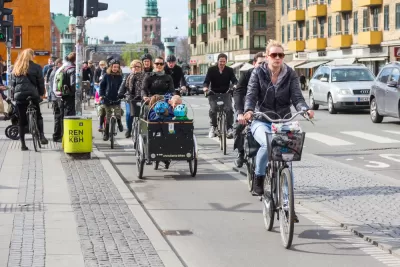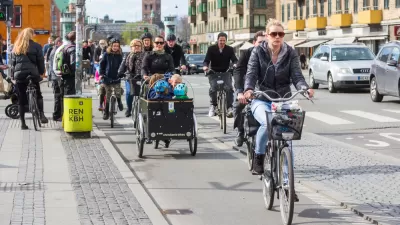Denmark's capital is a model city in terms of biking, but the reasons that bikes rule go beyond political leadership and robust infrastructure.

Joe Cortright explores the factors that have put Copenhagen at the forefront of cycling. Strong political support for biking and huge investments in infrastructure are significant, but policies related to driving and housing have also helped make biking the mode of choice.
Cortright points out that Denmark has a high gas tax as well as an excise tax of 150 percent on most new vehicles. "Making cars and driving more expensive creates powerful incentives for people to live in places where there are good alternatives to car travel (including transit, walking and cycling), and to utilize these modes regularly."
In addition, Copenhagen has different housing and home ownership patterns. Almost two-thirds of housing is multifamily, and the nation also supports a tenant-governed system of social housing. The resulting density makes cycling more feasible and attractive, says Cortright.
FULL STORY: Copenhagen: More than bike lanes

Maui's Vacation Rental Debate Turns Ugly
Verbal attacks, misinformation campaigns and fistfights plague a high-stakes debate to convert thousands of vacation rentals into long-term housing.

Planetizen Federal Action Tracker
A weekly monitor of how Trump’s orders and actions are impacting planners and planning in America.

San Francisco Suspends Traffic Calming Amidst Record Deaths
Citing “a challenging fiscal landscape,” the city will cease the program on the heels of 42 traffic deaths, including 24 pedestrians.

Defunct Pittsburgh Power Plant to Become Residential Tower
A decommissioned steam heat plant will be redeveloped into almost 100 affordable housing units.

Trump Prompts Restructuring of Transportation Research Board in “Unprecedented Overreach”
The TRB has eliminated more than half of its committees including those focused on climate, equity, and cities.

Amtrak Rolls Out New Orleans to Alabama “Mardi Gras” Train
The new service will operate morning and evening departures between Mobile and New Orleans.
Urban Design for Planners 1: Software Tools
This six-course series explores essential urban design concepts using open source software and equips planners with the tools they need to participate fully in the urban design process.
Planning for Universal Design
Learn the tools for implementing Universal Design in planning regulations.
Heyer Gruel & Associates PA
JM Goldson LLC
Custer County Colorado
City of Camden Redevelopment Agency
City of Astoria
Transportation Research & Education Center (TREC) at Portland State University
Jefferson Parish Government
Camden Redevelopment Agency
City of Claremont




























